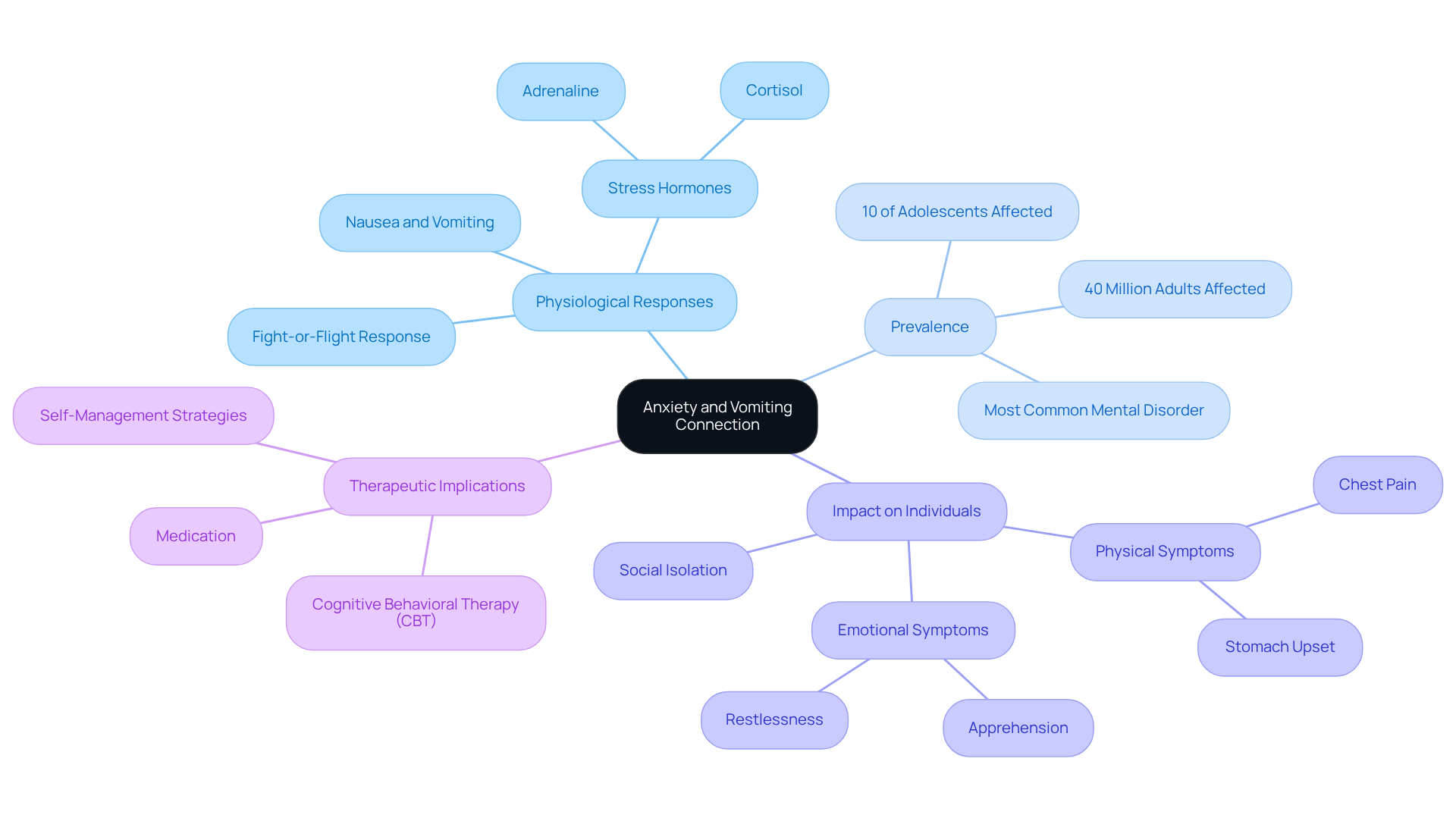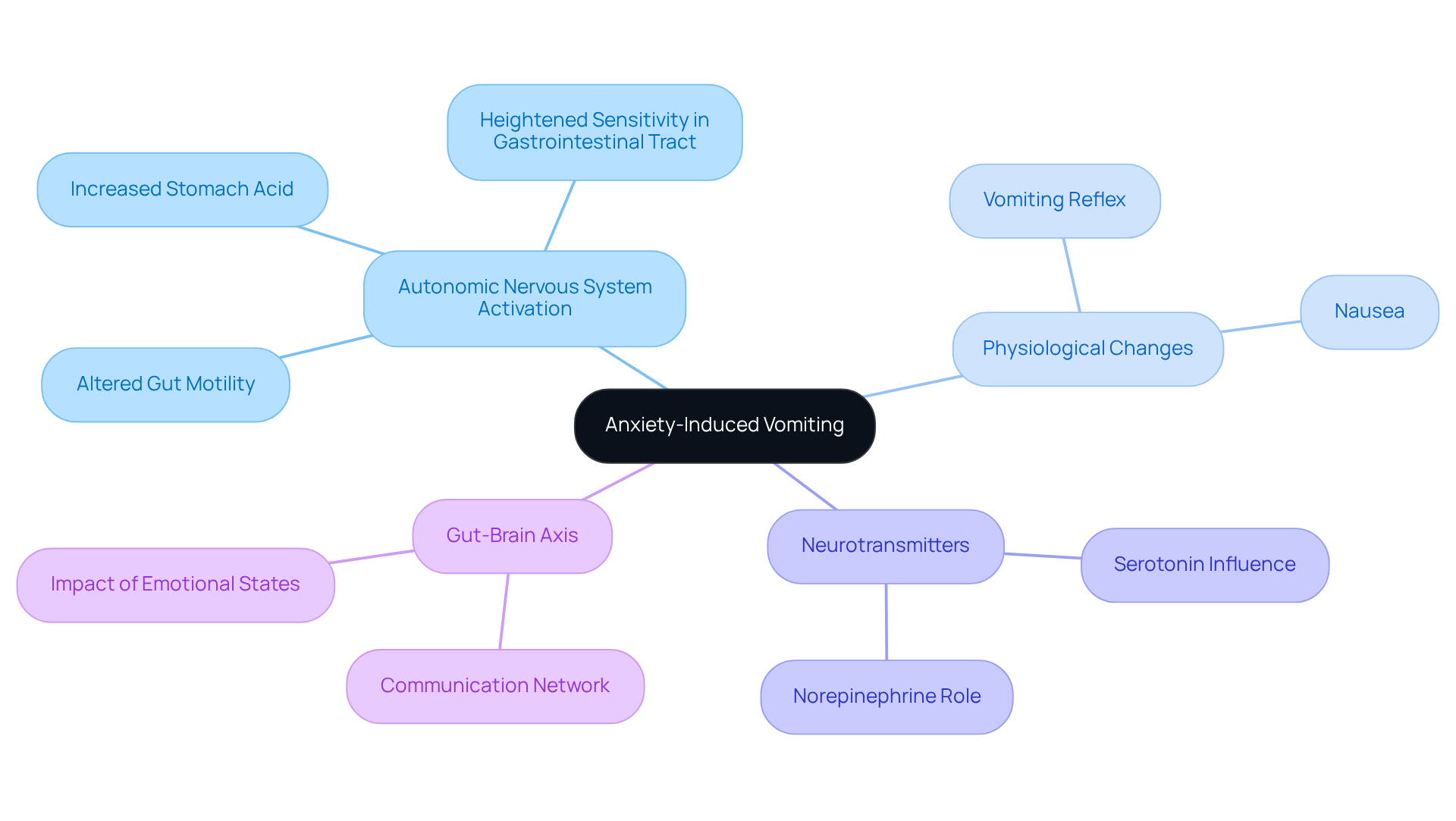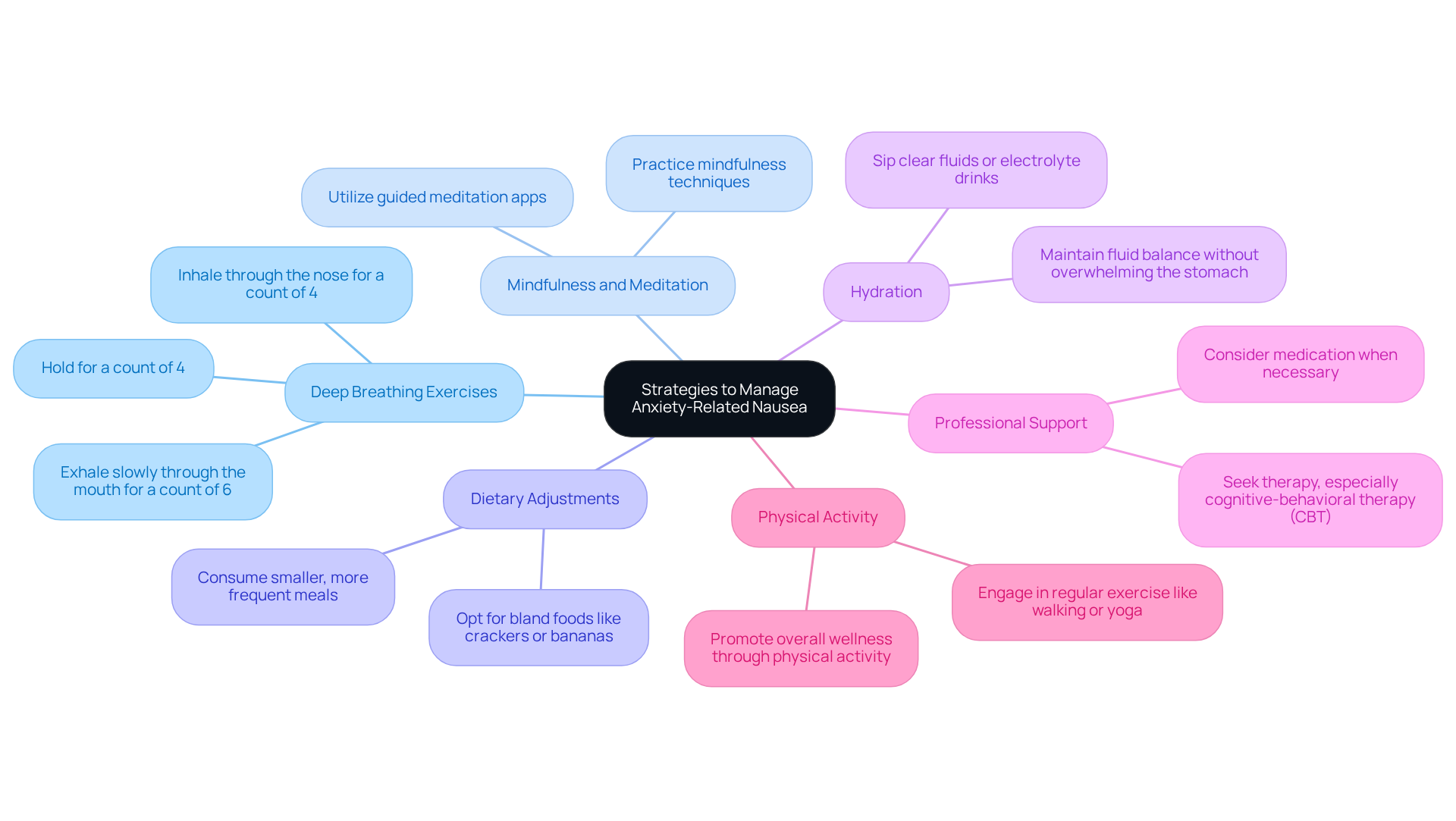Overview
Anxiety can indeed manifest as a physical symptom, such as vomiting. This occurs primarily due to the body's fight-or-flight response, which disrupts normal digestive processes and can lead to feelings of nausea. Have you ever experienced this overwhelming sensation? It’s important to understand that this connection is rooted in physiological changes, like increased stomach acid production and altered gut motility. Recognizing these symptoms is crucial for effective management and support.
As we explore this further, acknowledging the impact of anxiety on our bodies can foster a sense of healing. Understanding these physical responses not only validates your experience but also opens the door to seeking help. Remember, you are not alone in this journey, and there are compassionate resources available to support you. Taking the step to address these feelings can lead to a healthier, more balanced life.
Introduction
Anxiety can often manifest in unexpected ways, with physical symptoms that may feel just as distressing as the emotional turmoil itself. A particularly troubling question arises: can anxiety cause vomiting? In this article, we will explore the intricate relationship between anxiety and gastrointestinal distress, delving into how the body’s natural responses to stress can lead to nausea and vomiting.
As individuals grapple with the overwhelming sensations that accompany anxiety, understanding this connection becomes crucial. Have you ever felt overwhelmed by these sensations? What strategies can be implemented to manage these distressing symptoms and reclaim a sense of control?
Together, we can navigate this journey towards healing.
Explore the Connection Between Anxiety and Vomiting
Anxiety can significantly impact our bodies, which raises the question: can anxiety cause vomiting as one of the various physical symptoms? This connection often arises from the body's natural fight-or-flight response, which activates during moments of intense stress or pressure. When we encounter perceived threats, our bodies release stress hormones like adrenaline and cortisol, which can disrupt normal digestive processes. As a result, many individuals may experience nausea, leading to the question of whether anxiety can cause vomiting in severe cases.
Research indicates that a common question is whether anxiety can cause vomiting, especially among those with panic disorders or high levels of stress, which highlights the . It's noteworthy that anxiety is the most prevalent mental disorder in the United States, affecting around 40 million adults, and about 10% of teenagers aged 3-17 years also face this challenge. Have you ever felt overwhelmed by your body’s reactions during anxious moments? Panic attacks can lead to intense physical responses, such as stomach upset, further illustrating the connection between anxiety and physical distress.
Acknowledging this connection is crucial for those who may not fully understand why they feel physically unwell during anxious times. By recognizing these symptoms, individuals can navigate their experiences more effectively and seek the support they deserve. Remember, you are not alone in this journey, and understanding your feelings is a powerful step towards healing.

Understand the Physiological Mechanisms of Anxiety-Induced Vomiting
Anxiety-induced vomiting can be a distressing experience, and exploring whether anxiety can cause vomiting can help in understanding the physiological mechanisms behind it. The interplay between the brain and the gastrointestinal system is complex, yet crucial to grasp. When , the brain activates the autonomic nervous system, which governs involuntary bodily functions. This activation can lead to increased stomach acid production, altered gut motility, and heightened sensitivity in the gastrointestinal tract. Have you ever felt your stomach churn during stressful moments? This is a common reaction that many can relate to.
Neurotransmitters such as serotonin and norepinephrine play significant roles in this process. For instance, serotonin, primarily found in the gut, can influence sensations of sickness. It’s fascinating how our emotions can manifest physically, isn’t it? Additionally, the gut-brain axis—a communication network between the gastrointestinal system and the brain—further illustrates how our emotional states can directly impact digestive health. As we explore this further, it becomes clear that these symptoms raise the question of whether anxiety can cause vomiting, as they are not merely psychological; they are rooted in physiological changes.
Recognizing these mechanisms can empower individuals to understand their experiences better. It’s important to remember that you are not alone in this journey. Seeking support and therapy can be a vital step towards healing. By acknowledging the connection between your mind and body, you can take proactive steps to nurture your well-being.

Implement Strategies to Manage Anxiety-Related Nausea
Effectively handling anxiety-related discomfort involves considering whether anxiety can cause vomiting and requires a multifaceted approach that combines lifestyle adjustments, therapeutic techniques, and, when necessary, medical interventions. Have you ever felt overwhelmed by your past? Here are several strategies to consider:
- Deep Breathing Exercises: Engaging in deep breathing can significantly calm the nervous system and alleviate feelings of nausea. A simple technique involves inhaling deeply through the nose for a count of four, holding for four, and then exhaling slowly through the mouth for a count of six. This method not only lessens stress but also assists in anchoring you in the present moment. As Thich Nhat Hanh wisely stated, "Feelings come and go like clouds in a windy sky. Conscious breathing is my anchor."
- Mindfulness and Meditation: Mindfulness techniques, like meditation, can help you remain grounded in the present, thus decreasing stress levels and related physical symptoms. Utilizing guided meditation apps can enhance this experience, making it easier to incorporate mindfulness into your daily routine.
- Dietary Adjustments: Consuming smaller, more frequent meals can prevent an empty stomach, which may worsen nausea. Opting for bland foods like crackers, toast, or bananas can provide relief, as these are gentler on your digestive system.
- Hydration: Maintaining hydration is crucial, especially if vomiting occurs. Sipping clear fluids or electrolyte drinks can help sustain fluid balance without overwhelming your stomach, which is vital for overall well-being.
- Professional Support: Seeking therapy, particularly cognitive-behavioral therapy (CBT), can provide you with customized coping strategies for your specific stress triggers. In certain situations, medication might also be prescribed to effectively manage symptoms of unease. Significantly, only around 20% of adults with mental health disorders receive suitable pharmacotherapy, underscoring the necessity of pursuing effective treatment.
- Physical Activity: Regular exercise is beneficial for reducing anxiety levels and enhancing digestive health. Activities such as walking, yoga, or swimming can be particularly effective in promoting overall wellness.
By implementing these strategies, you can proactively manage your anxiety-related nausea and explore how anxiety can cause vomiting, leading to improved quality of life and emotional well-being. The Emerald Couch emphasizes a , focusing on helping clients recalibrate, recover, and heal from past experiences.

Conclusion
Anxiety profoundly impacts both the mind and body, and understanding this connection is crucial as it can lead to physical symptoms like vomiting. This relationship between anxiety and gastrointestinal distress is not just anecdotal; it stems from physiological responses that occur during stressful times. By acknowledging this interplay, individuals can approach their experiences with greater awareness and seek the support they need.
As we explore this further, various mechanisms come to light, such as:
- The activation of the autonomic nervous system
- The role of neurotransmitters like serotonin
- The gut-brain axis, which illustrates how our emotional states can influence digestive health
Practical strategies for managing anxiety-related nausea are also important to consider. Techniques like:
- Deep breathing exercises
- Mindfulness practices
- Dietary adjustments
- Professional support
can make a significant difference.
Ultimately, understanding the relationship between anxiety and vomiting not only empowers individuals to navigate their symptoms more effectively but also emphasizes the importance of holistic approaches to mental health. Have you ever felt overwhelmed by your anxiety? By taking proactive steps to manage it, you can improve your overall well-being and foster a healthier connection between your mind and body. Seeking help is a vital part of the journey toward healing, and recognizing that anxiety can manifest in physical ways is the first step in reclaiming control over your health.
Frequently Asked Questions
Can anxiety cause vomiting?
Yes, anxiety can cause vomiting as one of the physical symptoms due to the body's natural fight-or-flight response, which activates during moments of intense stress.
How does the fight-or-flight response relate to vomiting?
During the fight-or-flight response, the body releases stress hormones like adrenaline and cortisol, which can disrupt normal digestive processes, leading to nausea and potentially vomiting.
Who is most affected by anxiety-related vomiting?
Individuals with panic disorders or high levels of stress are particularly likely to experience vomiting as a symptom of anxiety.
How common is anxiety as a mental disorder?
Anxiety is the most prevalent mental disorder in the United States, affecting around 40 million adults, and about 10% of teenagers aged 3-17 years also face anxiety challenges.
What physical reactions can occur during panic attacks?
Panic attacks can lead to intense physical responses, including stomach upset, further illustrating the connection between anxiety and physical distress.
Why is it important to acknowledge the connection between anxiety and physical symptoms?
Acknowledging this connection helps individuals understand why they may feel physically unwell during anxious times, enabling them to navigate their experiences and seek appropriate support.




